Fact:
On May 8, 2019, Taliban insurgents detonated an explosive-laden vehicle and then broke into American NGO Counterpart International’s offices in Kabul. At least seven people were killed and 24 were injured.
Following is the May 2023 installment of “ISIS Redux: The Central Syria Insurgency,” a monthly chronicle of attacks by the terrorist group ISIS in central Syria. A review of developments throughout 2022 and 2021 can be found here and here. The January 2023 edition can be found here, February’s here, March’s here, and April’s here. A full background and analysis of ISIS’s resurgence in Syria, including the methodology used to collect this data, can also be explored here, here, and here.
ISIS carried out at least 13 confirmed attacks in May in Raqqa, Aleppo, Homs, Hama, and Deir Ez Zor governorates. These attacks killed at least 21 pro-Assad regime soldiers and at least one civilian and wounded at least nine additional soldiers and civilians. There were also three high quality* attacks during the month. May marked an overall reduction in ISIS activity following two very high tempo months in which at least 187 people were killed during 75 confirmed attacks in central Syria. Most of May’s reduced activity can be attributed to the near total absence of attacks on civilians, which had accounted for more than half (42) of March and April’s documented incidents. By May, however, Syria’s truffle season had wound down and many tribes issued orders for their people not to travel into the desert anymore. These factors, combined with an overall general decline in ISIS activity, significantly reduced the number of attacks on civilians during the month.
Instead, 12 of May’s 13 incidents targeted security forces—only slightly fewer than the number of attacks against security forces in April (18), March (15), and February (14)—despite May having significantly fewer overall attacks. Furthermore, ISIS cells targeted security forces in all five governorates which constitute the Badia for the third month in a row. Despite the number of attacks targeting security forces being relatively in line with those of the past three months, the severity of attacks has generally declined. Only five of May’s attacks were confirmed to involve small arms, while in six, mines or improvised explosive devices (IEDs) were utilized. In two attacks, the means were unknown. This represents a general continued regression to a more passive posture which began in the second half of April, compared to the high tempo, aggressive trend witnessed from February through the first half of April.
ISIS has still claimed no attacks in central Syria this year, despite a significant number of small arms and IED attacks against regime security forces and sustained fighting against regime and Russian Wagner mercenaries, as documented by this author. It remains unclear why ISIS has ceased media production in central Syria. The group published no media from the region for seven months between November 2021 and June 2022, followed by a multi-page editorial in late July hinting at the need for media silence due to security concerns, while heralding continued operations during the period, using previously unpublished pictures of attacks. It is possible ISIS has imposed a media blackout to bolster operational security.
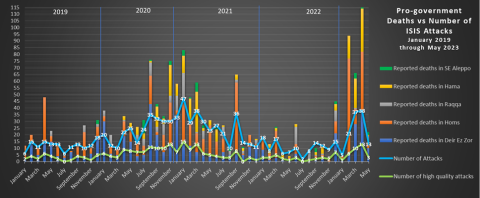
ISIS attacks dropped signficantly in Deir Ez Zor (4), Homs (4), and Hama (2) while rising slightly in Raqqa (2) and remaining unchanged in Aleppo (1).
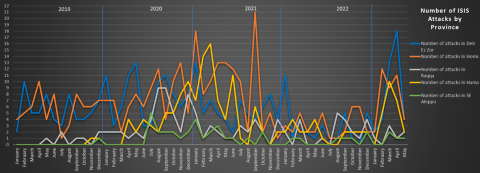
Deir Ez Zor and Raqqa
The number of ISIS attacks in Deir Ez Zor in April was unprecedented, more than at any point since the beginning of the insurgency in 2018. May witnessed a near total reversal, with only four attacks, three carried out using mines or IEDs.
On May 2, eight pro-regime tribal militiamen were killed when their vehicle hit a mine or IED outside the town of Duwayr. It is unclear if the men were all killed in the same incident, or if several of them died in an initial explosion and the rest were killed by a second explosion when they arrived to assist. This was the deadliest attack of May.
On May 7, another local fighter was killed by a mine outside Subaykhan, the same area where ISIS militants kidnapped seven shepherds in early April. On May 20, two more mines or IEDs destroyed two heavy cranes being used to repair infrastructure near Duwayr, and on May 24, a regime soldier was killed somewhere in the governorate.
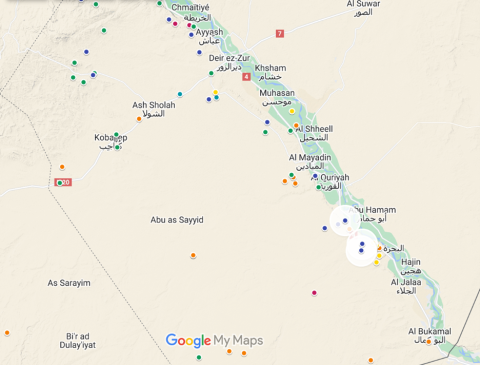
Map of locatable ISIS attacks in Dier Ez Zor (highlighted) in May 2023 alongside all other attacks in 2023. Not mapped is one attack that occurred somewhere in the Deir Ez Zor countryside.
Homs and Raqqa
April witnessed the end of the month-long regime offensive to secure al-Kawm, the strategic village in northeast Homs, but ISIS activity has continued in this region. There were at least four ISIS attacks in Homs in May, all of which occurred in the Sukhnah-Taybeh region, just south of Kawm.
On May 13, a soldier was killed near Sukhnah, and on May 16 two more soldiers were killed around Sukhnah in a small arms attack. On May 24, a Liwa al-Quds patrol hit two mines/IEDs outside a small hamlet south of Taybeh. Both vehicles were destroyed and the group reported one death and seven wounded in the incident. That same day, two Homs National Defence Forces (NDF) members were killed when ISIS militants attacked their position somewhere in the Sukhnah region.
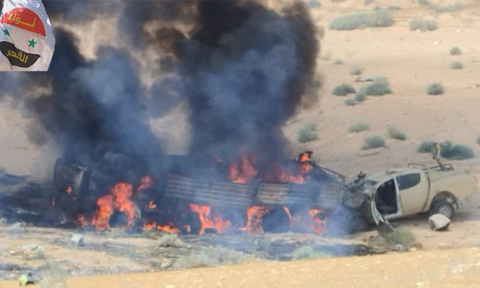
Picture posted on a Liwa al-Quds Facebook page showing the two destroyed vehicles.
On May 14, ISIS ambushed a regime colonel and his escort somewhere in Raqqa, likely on the Salamiyah-Resafa road, killing the officer and at least two others. Colonel Iyad Sarkel was the commander of artillery units for the 17th Division in Deir Ez Zor (some reports claim Deir Ez Zor City, others say the governorate) and is the highest ranking Syrian officer killed in the Badia in a year.
On May 19, pro-regime sources reported that Russian Wagner mercenaries clashed with ISIS militants south of Resafa. At least one Wagner fighter was wounded in the fighting, but the group was able to capture four ISIS members.
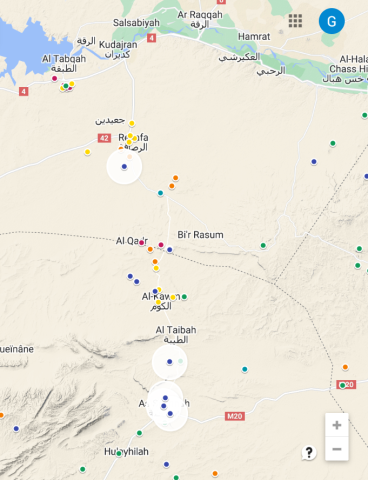
Map of locatable ISIS attacks in Homs and Raqqa (highlighted) in May 2023 alongside all other attacks in 2023. Not mapped is one attack that occurred somewhere in the Raqqa countryside.
Hama and Aleppo
ISIS activity dropped significantly in Hama in May, with only two confirmed attacks recorded. On May 2, a mine killed one shepherd and wounded a second near the village of Kabasin, just outside Sa’an. On May 20, an ISIS cell reportedly attempted a fake checkpoint attack on a food convoy traveling between Ithriya and Sukhnah. The attack allegedly failed and an Air Force Intelligence detachment was able to respond, triggering clashes.
ISIS also conducted one attack in southeast Aleppo, the third month in a row that an incident has been recorded here. On May 5, two members of the regime’s 25th Division were killed by a mine or IED somewhere in the Khanasir area.
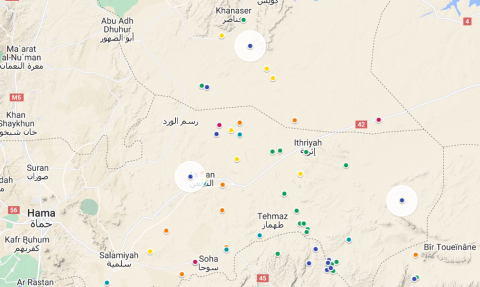
Map of locatable ISIS attacks in Hama and Aleppo in May 2023 (highlighted) alongside all other attacks in 2023.
Looking Ahead
As expected, ISIS attacks dropped significantly in May following nearly three months of record-breaking activity in the Badia. ISIS fighters have maintained a low level of pressure on regime forces, particularly in the Sukhnah area of Homs and the eastern Hama-southern Raqqa region, which appears to be a key conduit for ISIS cells. For its part, the regime and its allies, particularly the Russian Wagner group, continue to conduct limited sweeps and patrols across the Badia. Of note are the numerous ISIS militants captured in recent sweeps. Several were captured during the fighting around al-Kawm in March and early April, five were captured south of Sukhnah near the ISIS-held Wadi Doubayat in late April, and four more were taken by Wagner after clashes in Raqqa in mid-May. Information gleaned from these captured fighters could help the regime and its allies rout ISIS camps or intercept communications and movement.
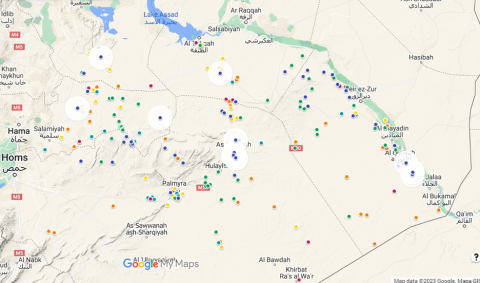
Map of locatable ISIS attacks (highlighted) in May 2023 alongside all other attacks in 2023. Note that not included is one attack conducted somewhere in the Deir Ez Zor countryside and one attack somewhere in the Raqqa countryside. To view an interactive version of this map, please click here.
---
*High quality attacks are defined as attacks behind frontlines, those that result in seized positions, target regime officers, involve coordinated attacks on multiple positions, fake checkpoints, ambushes on military convoys, or attacks on checkpoints that kill at least three soldiers or lead to POWs.
Extremists: Their Words. Their Actions.
Fact:
On May 8, 2019, Taliban insurgents detonated an explosive-laden vehicle and then broke into American NGO Counterpart International’s offices in Kabul. At least seven people were killed and 24 were injured.
Get the latest news on extremism and counter-extremism delivered to your inbox.